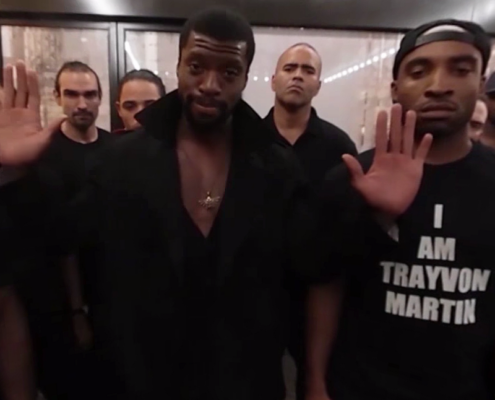“The Color Purple and the Politics of Forgiveness”
Selection
I want to spend some more time with the novel’s revision of masculinity, because I think it’s important to link Walker’s ethical position with a particular twenty-first-century political position. In an interview with Justine and Michael Toms in 1996, Walker reminded her audience that she loves Albert “as much as I love anyone else in the book. […] if I didn’t love him so much I wouldn’t have taken the trouble to put him through all of the changes that he goes through to become the kind of person who can be talked to and who can listen.” Albert is a man who has repeatedly beaten Celie, violated her, and treated her as less than human, but Walker has Celie forgive him in the novel. Albert is, in Walker’s understanding, capable of changing, of becoming a good person and letting go of the enculturated masculinity that has previously structured his behavior.
But is forgiveness a political position? I ask this question because Walker has specifically said that her work is “grounded in spirituality rather than in politics,” and critics have often noted that The Color Purple emphasizes personal transformation over collective political action. In bell hooks’ essay on the novel, for example, she argues, rather damningly that:
Walker creates a fiction wherein an oppressed black woman can experience self-recovery without a dialectical process; without collective political effort; without radical change in society.
Queer theorist Lauren Berlant mostly agrees, closing their essay on The Color Purple by noting that “Such an emphasis on individual essence, in a false opposition to institutional history, seems inadequate to the construction of any national consciousness, especially one developing in a hostile, negating context.”
But if the novel fails in political terms, it’s important to note that avoiding what is usually understood as “politics” is precisely one of the book’s aims. As Berlant remarks at the beginning of their essay:
The Color Purple deliberately fashions [a separation between the aesthetic and the political] in its attempt to represent a national culture that operates according to “womanist” values rather than patriarchal forms. While political language is laden with the historical values and associations of patriarchal power, aesthetic discourse here carries with it a utopian force that comes to be associated with the spirit of everyday life relations among women.
Walker’s novel creates somewhat of a utopian fantasy: she reimagines masculinity; she attempts to rethink familial structures from a queer perspective; she rejects the patriarchal white deity of Christianity in favor of the divine power of the natural world; she offers forgiveness instead of punishment; and she sets all of this in the racially segregated Southern United States of the 1930s and 1940s. These are not expressly apolitical positions but rather positions that begin first with individuals and our imaginations. These are political positions that attempt to imagine the world as it could be. Walker finds that the first step to any change in the world is to rethink the limitations we have accepted in our own minds for what is possible.
If Walker’s ideas here seem apolitical because of their apparent impracticality, perhaps this is because we have so frequently been unwilling to think with Walker, to attempt to recognize the limitations of our own imaginations when it comes to masculinity, queer families, the divine, and forgiveness. As one example of thinking that many people consider impractical, I’d like to return to the Broadway Circle Up performance organized to protest the continued loss of Black life at the hands of police forces nationwide. This performance, especially the contribution of The Color Purple cast, prompts us to consider the links between mainstream LGBTQ politics and the politics of the Black Lives Matter movement.
One allegedly impractical political goal that gained new popularity at the end of this decade was the movement to defund the police. Alex Vitale’s book The End of Policing was published in 2017, and the slogan “defund the police” gained more widespread popularity after the murder of George Floyd in 2020. As the Economist reported in the same year, however, “only a quarter of American adults are in favour of cutting funding for police departments outright,” and only around half of U.S. Americans prefer an approach that sees a redistribution of police funds toward “alternative first responders, such as social workers, drug counsellors and mental-health experts.” Another allegedly impractical political position that many lgbtq and antiracism activists have taken is the abolition of prisons in the United States. Criminologist and queer theorist Sarah Lamble, for example, has argued that “It is more important than ever to reject strategies that allow queer, trans, and feminist politics to be used for war, imprisonment, state violence, and racism. We must put antiviolence, anti-racism, and anti-prison struggles at the center of queer, trans, and feminist organizing efforts.” Lamble made this argument in 2015 in opposition to the much more popular organized politics around the passage of hate crime laws, LGBT inclusion in the U.S. military, and marriage equality. To many, the politics of police defunding and prison abolition have seemed impractical and even impossible; accordingly, organization around these issues has not seen widespread acceptance within LGBTQ political circles. It seems to me worth adding that LGBTQ politics frequently begin to appear utopian or impossible precisely at the places where they overlap with antiracist politics.
I’m spending time, especially, with the politics of prison abolition and police defunding because Walker’s novel takes up incarceration practices as a specific plot point when Sofia is imprisoned for defending herself in letters 37-41. Further, the novel explicitly links incarceration with sexual violence, corruption, and racism. The politics of prison abolition and police defunding also seem to me very closely linked to Celie’s forgiveness of Albert in The Color Purple. An ethics of forgiveness as opposed to an ethics of punishment would advocate for a decriminalization of sex-work, a decriminalization of poverty, and a more robust social safety net that treated people as possessing potential rather than risks. In the musical Albert says, “Maybe all my good lie ahead of me,” and The Color Purple actually trusts that this is possible. Walker advocates a spiritual change rather than a political one, but the spiritual and ethical ideas embedded in the novel and musical are actually structural ideas that work to expand the field of possibilities open to us; Walker’s allegedly impractical utopianism asks us to think with her to build a different, queerer, and more just world.



